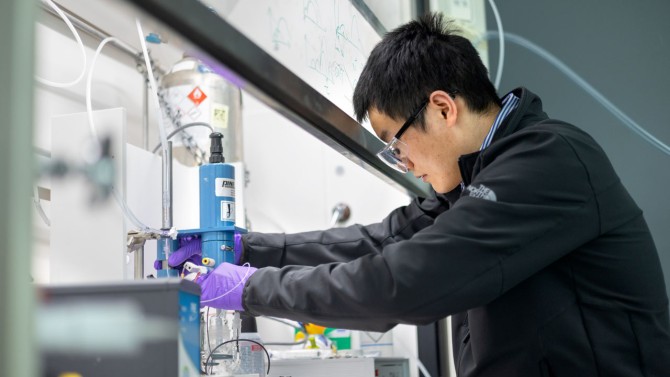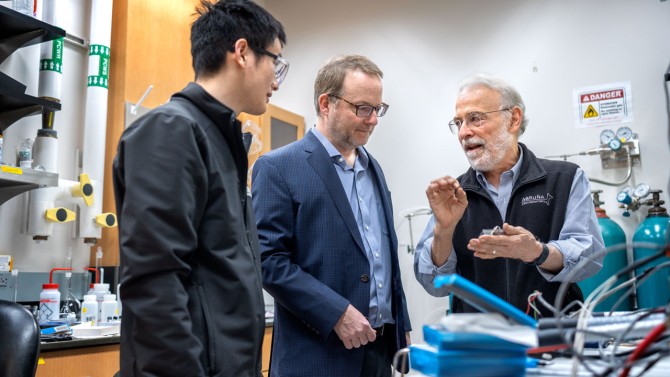Cornell and two Cornell research-startups have joined a consortium that aims to propose a Northeast research hub to make hydrogen a viable, clean-energy alternative to carbon-based fuels.
The New York-led multistate collaboration is guided by Gov. Kathy Hochul and organized by the New York State Energy Research and Development Authority (NYSERDA).
With approximately $9.6 billion available in federal funding, the U.S. Department of Energy (DOE) is expected to request proposals starting in early May for regional hydrogen centers that would offer a broad array of services, which will likely include research and demonstration projects. The Northeast group plans to apply for a portion of that federal funding.
“I’ve never seen anything quite like this in my entire career,” said Héctor Abruña, the Émile M. Chamot Professor in the Department of Chemistry in the College of Arts and Sciences, who will represent Cornell in the collaboration. He is also the director of the Center for Alkaline Based Energy Solutions (CABES), a national-level research consortium. “The level of commitment – by The White House and the Department of Energy – is astonishing.”
When used to power a fuel cell, hydrogen energy is far more efficient than carbon-based fuels, said Abruña. “Hydrogen can be incredibly efficient,” he said. “A hydrogen fuel cell engine – even if you mess it up – is almost triple in efficiency” compared to gasoline (internal combustion) engines.
Abruña will be joined by Cornell research spinoff Ecolectro, a startup company at Cornell’s McGovern Center business incubator, and by Standard Hydrogen Corporation, a Cornell-related company, which are among 40 partners to develop the regional proposal.
Gabriel Rodríguez-Calero, Ph.D. ‘14, Ecolectro’s chief executive officer and Kristina Hugar, Ph.D. ‘15, chief scientific officer, will represent Ecolectro. Geoffrey Coates, the Tisch University Professor of Chemistry (A&S), whose research includes the development of polymeric materials for economical energy storage and conversion technologies, as well as Abruña, serve as scientific advisors to Ecolectro.
Abruña and Coates are faculty fellows at the Cornell Atkinson Center for Sustainability.
For decades, clean (so-called green) hydrogen fuel had been costly to produce because it required the use of platinum, an expensive precious metal needed in electrolyzers and fuel cells. But in 2018, the DOE granted $1.7 million to Ecolectro to develop alkaline exchange membrane materials used in water electrolyzers and fuel cells which enable the use of non-precious metal based electrocatalysts, which would dramatically lower the cost of green hydrogen and fuel cell production.
In February 2022, Abruña and a team of Cornell chemists announced a class of nonprecious metal derivatives that can catalyze fuel cell reactions just as well as platinum – but at a fraction of the cost. In March, the Abruña group and collaborators published a paper on a how a high activity and low cost nitrogen-doped, carbon-coated nickel anode catalyzed the hydrogen oxidation reaction which is essential in hydrogen fuel cells.
Fuel cell chemist Paul Mutolo ’94, executive director of CABES and chief executive officer of Standard Hydrogen Corporation, will represent his company for the hub effort.
Last year, Standard Hydrogen Corporation and National Grid (a consortium partner) announced plans to build New York’s first hydrogen “energy station” – which looks like a conventional gasoline filling station –in New York’s Capital Region. At that station, hydrogen would be produced renewably on-site – with electricity derived from sustainable wind or solar energy during the electrolysis process – turning it into a viable source of hydrogen. Completion is expected by early 2023.
The New York-led consortium includes Connecticut, Massachusetts and New Jersey, which have on-going, strong hydrogen and fuel cell-innovation research programs.
Other New York universities participating in the consortium include Columbia University, Rochester Institute of Technology, New York University, Stony Brook University (SUNY), City College of New York and University at Buffalo (SUNY).
“Expanding the hydrogen market is critical to New York’s aggressive pursuit of clean-energy alternatives that will supercharge our economy and advance our climate goals,” Hochul said. “Coalitions like this one serve as a model to the nation on the collaboration that is required to meet this moment and bring us closer to a carbon-neutral future.”




Comments are closed.